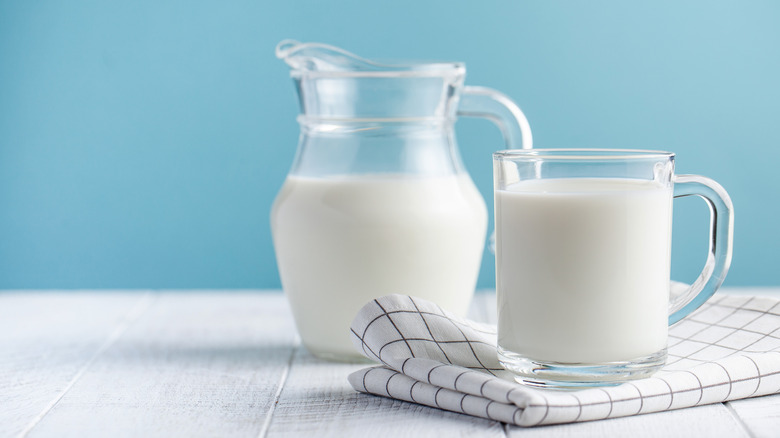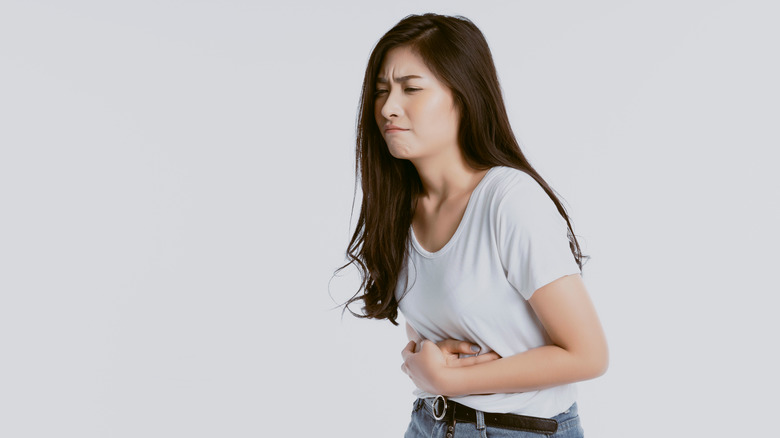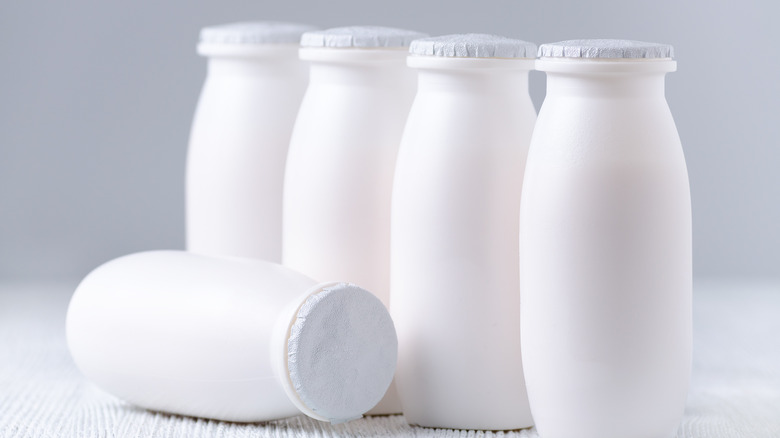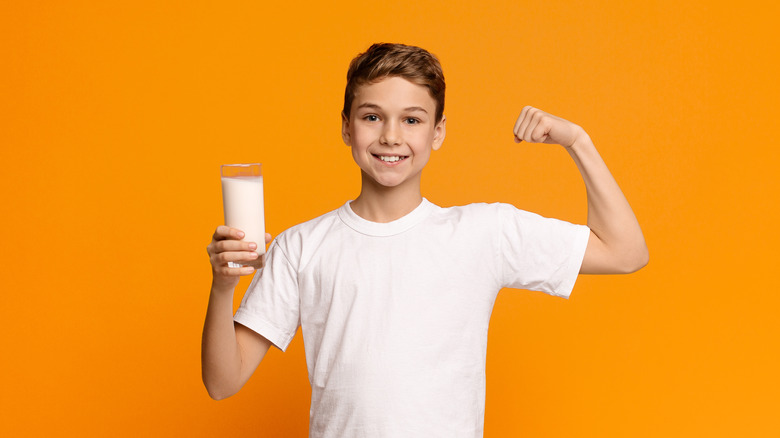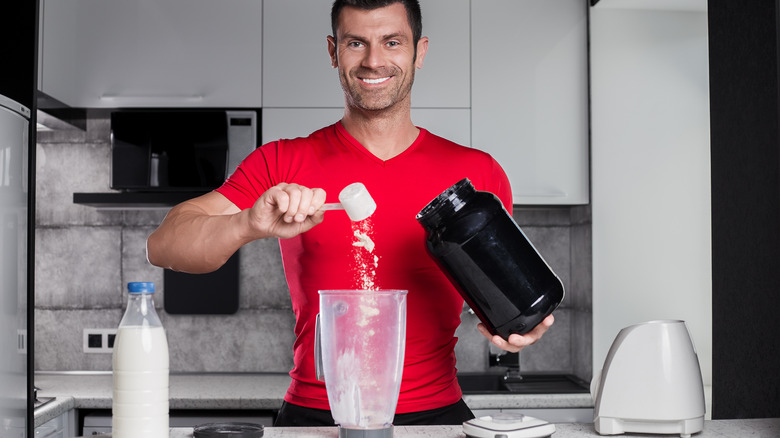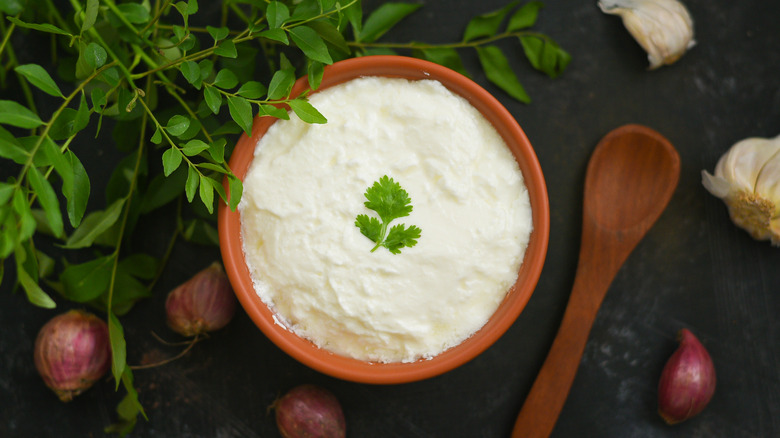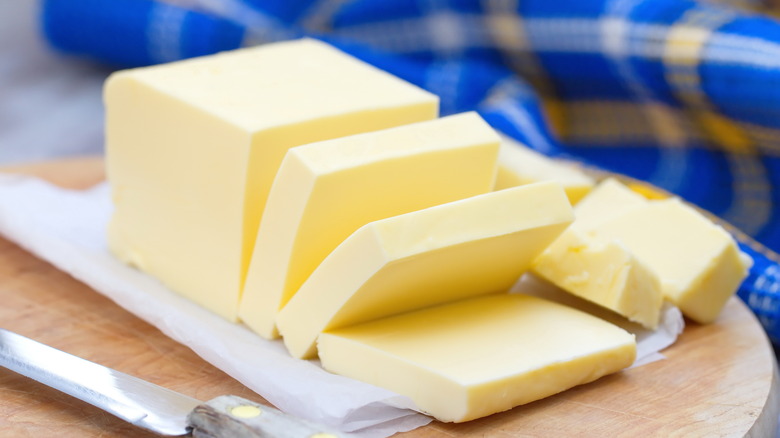When You Stop Eating Dairy, This Is What Happens To Your Body
Dairy is as ubiquitous as the air we breathe and, for many people, dairy products make up a large part of their diet. As a staple for thousands of years, the dairy industry is showing no signs of slowing down, with the worldwide industry projected to grow to over a trillion dollars by 2024 (per Statista). Aside from the fact that dairy products are cheap, readily available, and delicious (see: cheese), they also easily provide some fundamental nutrients needed by our bodies. "Dairy is a good source of vitamin D (when fortified), protein, and nutrients, including calcium and potassium," says registered dietitian nutritionist Maya Feller to Business Insider.
But, it's not all rosy. Lactose intolerance — where your body struggles to absorb and digest dairy products, resulting in unpleasant symptoms — is a highly common problem, with roughly one in three people in the U.S. having lactose malabsorption (per the NIH). What's more, the dairy industry has a huge impact on the environment, with high emissions of greenhouse gases and lack of sustainability associated with dairy farming, according to World Wildlife. This begs the question: do we need dairy? And what happens to our bodies if we give it up? Join us as we find out.
You might find yourself feeling a little less bloated
With dairy products long being associated with unpleasant digestive symptoms, it's little wonder that, if you're feeling bloated a little too often, giving up dairy may be the solution for you. "Even if you are not lactose intolerant, dairy can sometimes contribute to bloat, gas, and abdominal distention, which no one wants," states registered dietitian and "The Sugar Detox" author Brooke Alpert to Byrdie.
Remember though, while lactose intolerance is pretty common, per the Mayo Clinic, it might not be the root of any symptoms you could have, with casein sensitivity (via Mindd Foundation) also causing tummy upsets in some people. "Sensitivity to casein is not the same thing as lactose intolerance, which is the inability to break down and digest the lactose (milk sugar)," says Alpert. Alpert is quick to point out that dairy is not, in itself, bad for digestion, but rather people's reactions to it. If you aren't sure whether lactose intolerance or casein sensitivity is the cause of any digestive issues you might be having, Alpert recommends cutting out dairy for a few weeks and seeing if you notice any change. If there's a big difference, it could be the milk.
You might have withdrawal symptoms from giving up dairy
Trying to battle cheese cravings after giving up dairy? There's a reason that extends beyond the sheer deliciousness of the food. When you stop eating dairy, your body can react with tangible withdrawal symptoms, causing you to crave the lost food in your diet. According to naturopathic doctor Serena Goldstein, based in New York, dairy "acts on our opiate receptors that mimic feelings of addiction" (per Bustle). Indeed, a 2015 study demonstrated that cheese is addictive (via Mount Sinai). Although any symptoms you experience will vary, if you're cutting it out suddenly you could discover that you're finding it harder to sleep, or conversely more fatigued, according to nutritionist Frida Harju-Westman for Insider.
If you're cutting out dairy, the most important thing to do so that your body doesn't react negatively is to replace the nutrients you're getting from dairy with other food sources, states Livestrong. Fortified soy products can be a great replacement, as well as calcium sources like leafy greens, canned fish, or milk alternatives like almond or rice milk. Keeping an eye on your vitamin B2 intake is also important, as this can suffer if you're giving up dairy products; mushrooms, seafood, and fortified cereals can be worthy replacements here.
When you stop eating dairy, your immune system might suffer
There are many reasons why a tall glass of milk has long been considered the picture of health, and one of them is that dairy helps you stay healthy. "When you stop eating dairy, you might find that your immune system becomes considerably weaker," states nutritionist Frida Harju-Westman to Cosmopolitan. "This may be because you are lacking the important vitamin, B12. [Vitamin] B12 is commonly found in dairy products and assists in regulating the immune system and helping the body to fight bacteria."
As such, if you're finding yourself with the sniffles a bit more often, Harju-Westman suggests trying to prioritize eating foods that are higher or fortified with vitamin B12 to combat any deficiency. This vitamin is pretty abundant in many meat products, but it can be harder to come by if you're following a vegan lifestyle (or just want to avoid replacing dairy with, you know, loads of meat). Nutritional yeast, fortified cereals, meat substitutes, and fortified milk alternatives can all be great sources of this precious vitamin.
Removing dairy from your diet could affect your bone strength
Remember adults telling you that you had to drink your milk to grow big, strong bones? They weren't wrong. Giving up dairy products could cause your bones to suffer and lose strength, partly due to the efficiency with which dairy supplies your bones with necessary nutrients. "The reason why dairy products work is that they contain not only calcium and protein but also phosphorus, magnesium, vitamin D, potassium, and other things associated with good bone health," states Dr. Robert Heaney, bone biology specialist and professor of medicine at Creighton University, Omaha, to WebMD. "It's the logical way to go."
So, if you're giving up dairy and not actively replacing it with food sources that supply these, your bones could start to weaken. Remember, however, that there are loads of dietary sources of these nutrients; although calcium and vitamin D are often brought up as bone-essential nutrients that come in milk, "there are other sources of food containing both of these," says nutrition and exercise science professor at Central Washington University Kelly Pritchett to The Healthy. With vitamin D, says Pritchett, "our best source of vitamin D is from the sun — food isn't a great source."
Your skin health could improve when giving up dairy
If you experience frequent skin outbreaks and are struggling to pinpoint why, the answer could lie in your diet. And, if you stop eating or drinking dairy, you could find that your skin benefits. "Cutting dairy improves skin texture, skin tone, and acne," advises Washington, DC-based dermatologist Sarika Snell for Insider. This is partly due to the whey protein present in many dairy products, particularly in skim milk which, according to Snell, "is pro-inflammatory and can lead to inflammation which can manifest as acne and rosacea."
Skim milk contains several other ingredients that can make it problematic for your skin. Snell states that skim milk, and other cow's milk, can contain hormones, an increase of which can contribute to acne or other skin inflammations, as shown in a review published in Dermato-Endocrinology. To add to this, skim milk also contains a fairly high sugar content, meaning that its glycemic index is higher and that it could contribute to poorer skin health. Although skim milk has all the ingredients necessary to cause your skin potential problems, Snell states that to safeguard your skin, cutting out dairy entirely is the way to go.
Giving up dairy could reduce your protein intake
There's a reason why those protein shakes that the bodybuilders slam in the gym are often derived from dairy — it's an excellent natural source of protein. "An important macronutrient you gain from dairy is protein, which is essential for building muscles and helping your organs and bones to correctly function," states nutritionist Frida Harju-Westman to Cosmopolitan. "If you decide to go dairy-free then you need to pay closer attention to this."
The amount of protein that adults eat daily is often much higher than we need. Our minimum daily recommended intake is roughly 0.8 grams of protein per kilo of body weight each day, according to Harvard Health Publishing. As such, there's no reason to panic if dairy isn't a big part of your diet, and finding food sources that replace the protein lost is easily done. Aside from meat, protein sources like beans and certain nuts can not only be great choices but also cover other nutrients lost like calcium, says nutritionist Cynthia Sass for Health. Plant-derived protein, like pea protein, can also be a fine alternative, especially when coming in products that mimic dairy so you don't miss it too much.
You could be missing out on some probiotics
Certain dairy products are well-known for their probiotic qualities. "The term probiotic literally means 'for life,'" states registered dietitian Linda Antinoro, member of the Brigham and Women's Hospital Nutrition Consultation Service in Boston, to Today's Dietitian. "One of the better-known benefits of probiotics is that it helps with gastrointestinal problems like constipation, diarrhea, bloating, and gas." These probiotics contribute to the healthy functioning of your microbiome, a collection of live organisms that keep your body functioning healthily, regulating digestive function as well as helping to maintain a healthy immune system (via Cleveland Clinic).
That's why giving up dairy may mean that you're missing out on probiotics, as dairy is best-suited to their delivery, "since probiotics have a short shelf life and are easily destroyed by heat and acidic environments" states Georgia-based nutrition and feeding therapist Carol Ann Brannon. Alternatives, however, can be found and may come in fermented form. Sauerkraut and kimchi are two vegan probiotic powerhouses that can help keep your gut in good health (as well as being delicious), says Medical News Today. Elsewhere, miso, pickled vegetables, and sourdough bread can help your gut stay in good probiotic form.
You might find you get fewer headaches
Do you find yourself with a sore head a little too often? The answer could lie in the dairy you eat. There's a long-standing association between dairy consumption and headaches and, according to nutritionist Frida Harju-Westman, it can come from a natural chemical that's often found in cheeses, called tyramine, which can, for some people, contribute to the onset of migraines and headaches (via Insider)." Tyramine, an amino acid, can also be found in meat products and fermented foods and is usually more common in aged or smoked products. Reducing dairy and, therefore, reducing tyramine, could help alleviate headaches.
However, there's a drawback to stopping eating dairy which could increase your frequency of headaches. As dairy is rich in vitamin B12, reducing intake can cause a B12 deficiency which can be a cause of headaches, according to Harju-Westman. And, although people often cite dairy as the cause of a sore head, a large-scale study published in Complementary Therapies in Medicine found that people who ate more dairy actually had fewer headaches than people who ate less. If you find you suffer from headaches frequently, it could be worth experimenting with your diet to troubleshoot the source.
You might lose some weight after giving up dairy
Dairy products can be high in saturated fats and, although the effect of these dairy-based fats on health is still debated, for many people dairy isn't exactly a health food. And, you may find that by giving up dairy, you lose some weight. "I have had clients reduce body fat after giving up dairy," states dietitian Cynthia Sass for Health. However, the impact on body fat is less to do with the actual qualities of dairy as a contributor to body fat, and more "how [Sass' clients] consumed it [before], how much, and in what form."
So, if you're replacing a high-dairy diet comprised of less healthy processed foods like pizza and mac and cheese with whole food sources like grains and lean protein, then your diet will naturally get healthier, and any body fat reduction might reflect this: as New York-based nutritionist Keri Gans says, "It's not dairy itself; it's the way it's being consumed." And, there are also positives to dairy if you're seeking to lose body fat. An analysis of trials published in Clinical Nutrition, for example, found that consumption of dairy products can leave you feeling fuller for longer and can decrease overall food intake.
Giving up dairy could reduce inflammation — but the jury's still out
Joint pain can be a common concern for people of all ages, and for the 54 million American adults that have arthritis, over a quarter of them experience severe joint pain according to the CDC. Both periodic and chronic inflammation can contribute to this, and that's why it might be good to know that reducing your dairy intake could mean you experience less inflammation throughout your body. "Dairy products such as cheese and full-fat cow's milk contain saturated fat, and saturated fat can increase inflammation," advises registered dietitian Ashley Kitchens to Eat This. This is particularly noticeable if you have a dairy allergy or sensitivity, which can trigger an inflammatory response, although those with lactose intolerances may experience different symptoms that don't involve inflammation.
However, the association between dairy and inflammation is far from confirmed. A review of studies published in the Journal of the American College of Nutrition found that dairy products and proteins have "neutral to beneficial effects on biomarkers of inflammation," and that more studies are needed to focus more clearly on the link between the two.
Removing dairy from your diet can lower cholesterol
One of the reasons why dairy products are so darn delicious is due to the high fat content that's present in a lot of them. This fat, however, can come at a cost. Dairy often contains saturated fats that can increase your cholesterol, the fatty substance that builds up in your arteries and can increase your risk of cardiovascular disease (per the Mayo Clinic). Consuming less saturated fats, such as those found in dairy and meat products, can reduce cholesterol by 5-10%, according to Harvard Health Publishing.
However, although reducing dairy intake could certainly help reduce cholesterol, the link between dairy fats and cardiovascular disease may not be as simple as we think. According to Today's Dietitian, certain studies have shown a neutral or beneficial link between dairy fats and cardiovascular-disease risk in the long term, raising question marks about whether it's as bad as we think. "Moving forward, I think we need more research on whole foods rather than nutrients," says vice president of nutrition research for the National Dairy Council Mickey Rubin. "In the end, it is the whole package of a food that contributes to a health effect, and people eat foods, not nutrients."
You could find your sinuses feel clearer
Got a stuffed-up nose or a cough? Giving up dairy could help. According to nutrition coach Amina AlTai, "Dairy sensitivities can often cause respiratory distress, so I've seen clients who've given up dairy and it's profoundly impacted their asthma or they finally got rid of a chronic cough." (via Bustle)
So, if you're noticing that your airways are clearer once giving up dairy, it could be a sign of an undiagnosed dairy sensitivity or allergy. It's important to note the difference between that and lactose intolerance, and the difference in symptoms that can occur from each. Lactose intolerance affects the digestive system, causing gastric symptoms due to the inability to break down lactose, whereas a dairy allergy involves your immune system and prompts a reaction that can be observed in your breathing system and skin, as well as your digestive system (per WebMD). If you suspect you have either, the best thing to do is to talk with your physician and undergo tests to determine the best course of action. But, noticing that symptoms like a cough clear up with no dairy is a good indicator to give your doctor a call.
Cutting out dairy could give you improved energy levels
If you feel sluggish throughout the day, dairy could be the culprit, and giving it up could give you the energy boost you need. However, this may not be because of the dairy itself, but rather the choices that you're making that contain dairy, says nutritionist Frida Harju-Westman. "It's easy to fall into a habit of regularly eating unhealthy, dairy-rich foods such as creamy pasta, cheese, and pizza. When you give up dairy, you may find that you begin to think more carefully about the foods you eat," she says to Cosmopolitan.
These foods, according to Harju-Westman, might then be replaced by choices that are richer in vitamins, partly as a way to find food sources that are replacing lost nutrients from the dairy, like calcium, which is abundant in kale, white beans, and spinach. As Harju-Westman states, "Eating vitamin-rich foods such as this may well lead to having more energy as your diet becomes packed with more nutrients." It's worth pointing out that this rule applies to not only diets rich in dairy, but any diet. The more moves you make towards nutrient-dense food sources, the more alert and energized you may feel.

